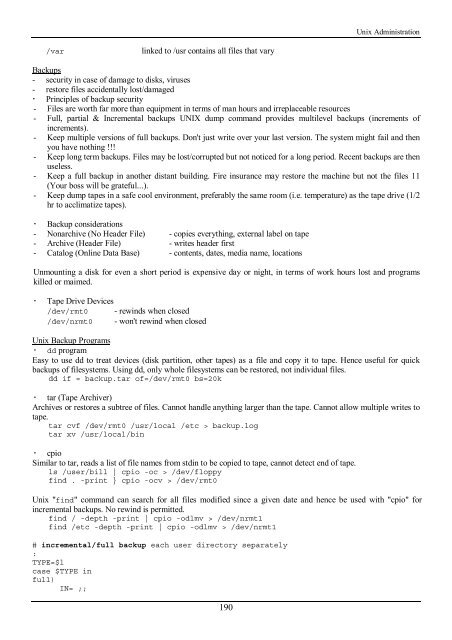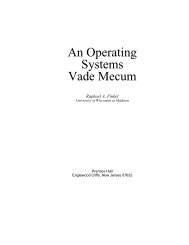You also want an ePaper? Increase the reach of your titles
YUMPU automatically turns print PDFs into web optimized ePapers that Google loves.
<strong>Unix</strong> Administration<br />
/var<br />
linked to /usr contains all files that vary<br />
Backups<br />
- security in case of damage to disks, viruses<br />
- restore files accidentally lost/damaged<br />
! Principles of backup security<br />
- Files are worth far more than equipment in terms of man hours and irreplaceable resources<br />
- Full, partial & Incremental backups UNIX dump command provides multilevel backups (increments of<br />
increments).<br />
- Keep multiple versions of full backups. Don't just write over your last version. The system might fail and <strong>the</strong>n<br />
you have nothing !!!<br />
- Keep long term backups. Files may be lost/corrupted but not noticed for a long period. Recent backups are <strong>the</strong>n<br />
useless.<br />
- Keep a full backup in ano<strong>the</strong>r distant building. Fire insurance may restore <strong>the</strong> machine but not <strong>the</strong> files 11<br />
(Your boss will be grateful...).<br />
- Keep dump tapes in a safe cool environment, preferably <strong>the</strong> same room (i.e. temperature) as <strong>the</strong> tape drive (1/2<br />
hr to acclimatize tapes).<br />
! Backup considerations<br />
- Nonarchive (No Header File) - copies everything, external label on tape<br />
- Archive (Header File) - writes header first<br />
- Catalog (Online Data Base) - contents, dates, media name, locations<br />
Unmounting a disk for even a short period is expensive day or night, in terms of work hours lost and programs<br />
killed or maimed.<br />
! Tape Drive Devices<br />
/dev/rmt0 - rewinds when closed<br />
/dev/nrmt0 - won't rewind when closed<br />
<strong>Unix</strong> Backup Programs<br />
! dd program<br />
Easy to use dd to treat devices (disk partition, o<strong>the</strong>r tapes) as a file and copy it to tape. Hence useful for quick<br />
backups of filesystems. Using dd, only whole filesystems can be restored, not individual files.<br />
dd if = backup.tar of=/dev/rmt0 bs=20k<br />
! tar (Tape Archiver)<br />
Archives or restores a subtree of files. Cannot handle anything larger than <strong>the</strong> tape. Cannot allow multiple writes to<br />
tape.<br />
tar cvf /dev/rmt0 /usr/local /etc > backup.log<br />
tar xv /usr/local/bin<br />
! cpio<br />
Similar to tar, reads a list of file names from stdin to be copied to tape, cannot detect end of tape.<br />
ls /user/bill | cpio -oc > /dev/floppy<br />
find . -print } cpio -ocv > /dev/rmt0<br />
<strong>Unix</strong> "find" command can search for all files modified since a given date and hence be used <strong>with</strong> "cpio" for<br />
incremental backups. No rewind is permitted.<br />
find / -depth -print | cpio -odlmv > /dev/nrmt1<br />
find /etc -depth -print | cpio -odlmv > /dev/nrmt1<br />
# incremental/full backup each user directory separately<br />
:<br />
TYPE=$l<br />
case $TYPE in<br />
full)<br />
IN= ;;<br />
190
















